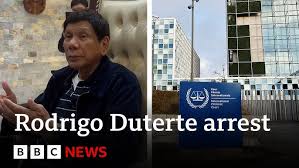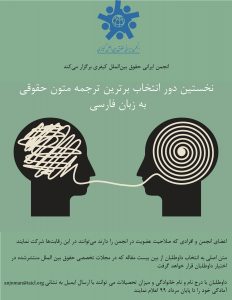
Introduction
On March 11, 2025, former President of the Republic of the Philippines, Rodrigo Duterte, was arrested pursuant to a warrant issued by Pre-Trial Chamber I of the International Criminal Court (ICC) under the authority of Article 58 of the Rome Statute. The arrest relates to alleged crimes against humanity committed during Duterte’s anti-drug campaign, which began during his tenure as Mayor of Davao City and continued throughout his presidency.
Issuance of Arrest Warrant under Article 58
The arrest warrant was issued on March 7, 2025, in accordance with Article 58(1) of the Rome Statute, which permits a Pre-Trial Chamber to issue a warrant of arrest upon application by the Prosecutor if:
“there are reasonable grounds to believe that the person has committed a crime within the jurisdiction of the Court” and if “the arrest of the person appears necessary to ensure the person’s appearance at trial, prevent obstruction or endangerment of the investigation or court proceedings, or prevent the person from continuing with the commission of that crime or a related crime.”
The charges pertain to Article 7(1)(a) of the Rome Statute, which defines “murder” as a crime against humanity when “committed as part of a widespread or systematic attack directed against any civilian population, with knowledge of the attack.
Jurisdiction of the Court: Article 11 and Article 127
Although the Philippines formally withdrew from the Rome Statute effective March 17, 2019, the ICC asserts continuing jurisdiction over crimes committed while the Philippines was a State Party.
This assertion is based on:
- Article 127(2) of the Rome Statute, which provides that withdrawal does not affect obligations incurred while still a State Party:
“A State shall not be discharged, by reason of its withdrawal, from the obligations arising from this Statute while it was a Party to the Statute… Such withdrawal shall not affect any cooperation with the Court in connection with criminal investigations and proceedings in relation to conduct which occurred while the State was a Party to the Statute.”
- Article 11(2), which limits the Court’s jurisdiction to crimes committed after the Statute entered into force for the State in question. The Rome Statute entered into force for the Philippines on November 1, 2011.
Accordingly, the Court maintains jurisdiction over alleged acts that occurred between November 1, 2011 and March 17, 2019, during which the Philippines was subject to the Court’s jurisdiction.
Admissibility and Complementarity – Article 17
The ICC may exercise jurisdiction only where national judicial systems are unwilling or unable genuinely to investigate or prosecute the relevant crimes. This principle, enshrined in Article 17(1)(a) of the Rome Statute, reads:
“The case is inadmissible where… the case is being investigated or prosecuted by a State which has jurisdiction over it, unless the State is unwilling or unable genuinely to carry out the investigation or prosecution.”
Given the perception of political unwillingness to prosecute Duterte domestically—and the formal withdrawal from the ICC—the Prosecutor concluded that the admissibility criteria were satisfied.
Initiation of the Investigation – Article 15
Filipino lawyer Jude Sabio filed a communication in 2017, alleging that Duterte orchestrated and incited extrajudicial killings through police and vigilante forces, particularly the so-called “Davao Death Squad.”
The investigation was initiated proprio motu by the ICC Prosecutor pursuant to Article 15(1) of the Rome Statute, without a referral from a member state. This allows the Prosecutor to initiate an investigation on their own initiative, based on information received from individuals or organizations.
Surrender of the Accused – Article 89
The surrender of Duterte to the ICC was carried out pursuant to Article 89(1) of the Rome Statute, which mandates:
“States Parties shall, in accordance with the provisions of this Part and the procedure under their national law, comply with requests for arrest and surrender.”
While the Philippines is no longer a State Party, the surrender may have been facilitated either voluntarily by the current government or in cooperation with a third-party state where Duterte was apprehended, consistent with Article 87(5), which allows the Court to seek cooperation from non-party states.
Immunity and Heads of State – Article 27
Duterte’s prior status as head of state does not afford him immunity before the ICC. Under Article 27(1):
“This Statute shall apply equally to all persons without any distinction based on official capacity.”
“In particular, official capacity as a Head of State or Government… shall in no case exempt a person from criminal responsibility under this Statute.”
Legal and Political Rationale for Surrender
The Philippine government’s decision to surrender Duterte likely reflects a combination of factors:
- International Pressure and compliance with international legal norms;
- Domestic Political Considerations, such as distancing the current administration from Duterte’s controversial legacy;
- Lack of Judicial Capacity or Will to investigate and prosecute crimes domestically; and
- A symbolic commitment to international human rights standards and the rule of law.
Conclusion
The arrest and surrender of former President Rodrigo Duterte represent a pivotal moment in the evolution of international criminal law. One of the most significant legal implications of this case is the reaffirmation of Article 127(2) of the Rome Statute, which establishes that withdrawal from the Statute does not extinguish the Court’s jurisdiction over crimes committed while a state was still a party. This provision is crucial in preventing strategic withdrawals by states attempting to evade accountability once they or their leaders become the subject of investigation. In Duterte’s case, the ICC’s reliance on this principle sends a clear message: a state cannot use withdrawal as a legal shield to protect its leaders from prosecution for crimes committed during its membership period. Moreover, the Court’s proceedings in this case underscore that the principle of complementarity (Article 17) cannot be circumvented through political inaction or lack of domestic judicial will. Where a national system is unwilling or unable to prosecute serious crimes, the ICC’s mandate becomes not only valid but necessary. Ultimately, this case may serve as a precedent for other post-withdrawal or politically sensitive situations. It reinforces the legitimacy and permanence of the Rome Statute’s obligations and the ICC’s jurisdiction. As such, it is a legal and symbolic triumph for the global effort to ensure accountability, deter future atrocities, and uphold the rule of international criminal law.
Written by: IAICL on 17th March 2025
_________________________________________________________________________________________________
Legal Instruments Cited:
- Rome Statute of the International Criminal Court:
- Article 7(1)(a) – Crimes Against Humanity: Murder
- Article 11(2) – Temporal Jurisdiction
- Article 15(1) – Prosecutor’s proprio motu power
- Article 17(1)(a) – Complementarity and Admissibility
- Article 27(1) – Irrelevance of Official Capacity
- Article 58(1) – Arrest Warrants
- Article 87(5) – Cooperation with Non-States Parties
- Article 89(1) – Obligation to Surrender
- Article 127(2) – Effect of Withdrawal
Sources:
- International Criminal Court official documents: www.icc-cpi.int
- Rome Statute of the International Criminal Court (1998)
- The Guardian (March 11, 2025)
- News reporting from Rappler, Al Jazeera, and Reuters (2023–2025)
- Communication to the ICC by Jude Sabio (2017)
- The Prosecutor v. Uhuru Muigai Kenyatta (ICC-01/09-02/11) – Kenya Situation
• Situation in the Republic of Burundi, Public Statement by the ICC Office of the Prosecutor (2017)
• William A. Schabas, An Introduction to the International Criminal Court, 5th ed. (Cambridge University Press, 2016)
• Gerhard Werle & Florian Jessberger, Principles of International Criminal Law, 4th ed. (Oxford University Press, 2020)

